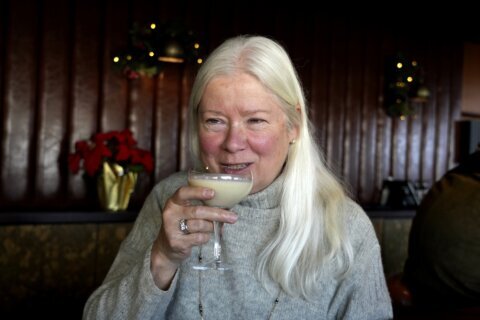PARIS (AP) — Like most self-respecting Parisians, Mathilde Joannard and Franck Tallieu had been training for the Olympic sport of Olympics-bashing.
Of course the Olympics were going to be a mess, the couple had reasoned when they learned the Games were coming to town. Like so many Parisians, the human resources executives assumed it would be crowded, or beastly hot, or chaotic, or a pain in the derrière to navigate. Or all the above.
So how did they end up dressed in rented “Three Musketeers” costumes with painted-on goatees, waving the tricolor flag gleefully for the cameras at the fencing competition?
They’re not really sure.
“We just decided to have fun with it,” said Joannard, engaging in some Gallic understatement as the couple enjoyed ice cream pops outside the majestic Grand Palais during a break in fencing on a brilliant summer day. She herself seemed a bit shocked by what she was saying.
“We’re really, really enjoying it,” she repeated. “I’m so glad we’re here.”
It seems many Parisians have undergone the same happy metamorphosis. At first pooh-poohing the audacious plan to turn the capital into one big Olympic venue — launched by an even more audacious opening ceremony along the Seine River — many have come to think it was a pretty cool idea after all.
And they’re taking it all in. Those who stayed, that is. As for those who left, some are sorry to have missed the fun.
Where’s the evidence of fun, you ask? How about a conga line? At beach volleyball, in the absurdly photogenic stadium nestled under the Eiffel Tower, a crowd of volunteers began just such a line Sunday night. A gaggle of fans joined in, following them around an upper tier of the stadium.
How about street dancing? The marquee cycling event a day earlier brought countless Parisians into the streets to cheer riders on, a mini-Tour de France showcasing the glittering capital. To the barricades, Parisians went — setting up speakers and dancing, even doing the wave with police officers at one spot.
Sure, many international visitors were among them, replacing some of the residents who purposely left early on summer holiday. But there have been countless local fans, displaying French pride with painted flags on their cheeks as they flocked to favored events like judo, featuring French star Teddy Riner, and swimming, where France’s hero of these Games, Léon Marchand, was holding court.
If you were around in 1998, you might have recalled a similar mood enveloping the city when France captured its first World Cup. For days afterward, briefcase-toting office workers rode the Metro with the tricolor on their cheeks. One could often hear spontaneous chants of “Et un, et deux, et trois-zéro” — a nod to the 3-0 score against Brazil in the final.
So perhaps it wasn’t surprising that at fencing last weekend, the crowd suddenly launched into the very same chant. To one longtime Parisian, that didn’t sound like an accident — and not just because these Games have seen a stellar French performance, with the country’s medal haul currently third after the United States and China.
“That 1998 World Cup was when we French realized we could be world champions,” said Dan-Antoine Blanc-Shapira, an event planner. “Maybe that’s also when we learned as a country that we could pull off something like this.”
Blanc-Shapira stayed in Paris for much of the Games. He and his family went to watch women’s rugby and track events, and simply wandered the Champs-Elysées, delighted to see the smiling faces on the famous boulevard.
“This may not be the real world right now, but it’s a very pleasant one,” he said. “Maybe we should do this more often.”
Even some of those who’ve eschewed the often-pricey Olympic competitions — and many Parisians have indeed been priced out — say they’ve experienced an unexpectedly pleasant, even relaxed feeling in the city.
“It’s unusually calm,” said writer Cathy Altman Nocquet. She chose not to attend Olympic events, but was delighted to stay in town. “It’s as if the entire city took a pill.”
Others noted the contrast between the current mood and the tense atmosphere just weeks earlier, as the country went through elections and political turmoil.
“This is such a nice distraction,” said Craig Matasick, a policy analyst who’s lived in Paris for 10 years. He and his family left for part of the Games because they thought things would be a mess, but found the city pleasant and much more relaxed than anticipated upon return.
Matasick’s family of four has taken advantage of the offerings, visiting the Olympic cauldron in the Tuileries gardens, the Club France fan hangout, table tennis and cycling so far. “This vision of the city as backdrop for the Games could have been a total logistical nightmare,” Matasick noted, “but it hasn’t been.”
Give Elodie Lalouette a medal — this Parisian had faith from the start. Lalouette, who works in communications for a national radio network, applied a year ago to be a volunteer. Now she’s taking two weeks’ annual leave to work at the field hockey venue.
“I was sure it would be super,” she said during a break this week. “And it has — it’s been incredible.” Most valuable are the interactions she’s had with people from around the world. And, perhaps even more, with fellow Parisians.
“They see me on the Metro, and they say ‘Salut’ and tell me it’s great that I’m doing this,” she said.
Some who left have had regrets. Teacher Judith Levy surprised herself by watching the competition on TV nonstop for the first few days. Then she had to leave for Italy, a trip booked months in advance.
“At the time, I felt like everything was going to go wrong,” she said of her travel plans. “Now I feel like I’m missing the party.”
Claire Mathisjen, too, has watched it all from afar — on holiday in Brazil. The Paris-based psychologist lengthened her usual August holiday to avoid the Games. But watching for hours on TV, she has found herself transfixed. And while she isn’t necessarily consumed with regret, she does feel something else: pride.
“I watched that opening ceremony and truly felt proud to be French, and a Parisian,” she said. “We pulled it off!”
Jean-Pierre Salson would not dispute that. What he’s discovered, though, is that what’s good for the national soul may not be good for the bottom line.
Salson, who owns a clothing store in the tourist-frequented Marais neighborhood, calculated just before the Games opened that business had tanked by 30-40% — a result of Parisians leaving and non-Olympics tourists staying away. He hoped things would improve after the opening ceremony, when security loosened.
Contacted again, he said they had not. Tourists had already spent too much on tickets and such, and weren’t focused on clothes.
Still, Salson will take no part in Olympics-bashing.
“I have nothing bad to say, I think it’s great,” he said of his country’s successful Games. “But for business, I think we will have to wait.”
He doesn’t have long to wait — the Olympics are closing in on their grand finale. For their part, Joannard and Tallieu, the temporary Musketeers, plan to keep enjoying events — including at the Paralympic Games.
The couple are grateful now for a dinner they had sometime before the Games with a few American friends, which helped transform their attitudes.
“We were doing the bashing,” says Tallieu. “But they were optimistic. You know what? They were right.”
___
Associated Press journalist Tom Nouvian contributed reporting.
___
For more coverage of the Paris Olympics, visit https://apnews.com/hub/2024-paris-olympic-games.
Copyright © 2024 The Associated Press. All rights reserved. This material may not be published, broadcast, written or redistributed.







